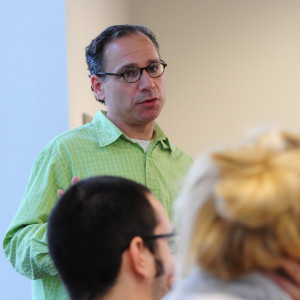Andrew Reiner, an English professor in the Honors College of Towson University, recently gave his students an interesting assignment: to send a text, in class, to a friend and confess the student’s real feelings about something that friend did to upset them.
“Their eyes bugged wider than when we had talked about hookups,” wrote Reiner in a recent viewpoint piece in the New York Times. “’I’m really hating you right now,’ one student murmured, half-jokingly, her eyes locked in the oncoming headlights.”
The assignment was hardly ordinary but neither is the class, a popular Honors seminar titled “The Search for Intimacy in the Age of Facebook,” which examines the ways that social media and texting are limiting deeper, more meaningful human connections.
“The brevity of texting, or textese, which calls for a carefully calculated language of emotionless evasion, sidesteps confrontation. In assigning the in-class texting experiment, I wanted students to take a risk and confront one of their biggest fears: stepping into the muck and mire of emotional candor and sincerity.”
That was a step into unfamiliar territory for many of Reiner’s students.
New research shows that the American college kid spends an average of three hours texting and close to two hours on Facebook every day, and can exhibit addict-like behavior when separated from his or her smartphone—a level of devotion that doesn’t leave much time for face-to-face, voice-to-voice social interaction.
The consequences?
“A small but growing body of evidence suggests that excessive social media use can lead to an unhealthy fixation on how one is perceived and an obsessive competitiveness,” wrote Reiner. “Perhaps not surprisingly, this angsting can also lead to an unhealthy quest for perfection, a social perfection, which breeds an aperture-narrowing conformity.”
“This is a generation so consumed with surface connection they will do anything to appear connected, including pretending to text when alone so they don’t look, as one student said, ‘like a total loser without friends,'” he opined.
To challenge these habits, Reiner next asked his students to sit down to a meal in a crowded, on-campus dining hall alone—no friends, no books, no laptops, no smartphones—and journal about how the experience made them feel.
“The results were sobering,” admitted Reiner.
“’I gathered my things and bolted out the door,’ one student wrote about her reaction once she finished her meal. ‘I was glad that I could feel like I belong somewhere again … . What I hated most was being alone and feeling like I was being judged for it.'”
One in-class student reaction, thought Reiner, stood out among the rest: “‘I realized something disturbing after doing this. If I don’t feel connected with others, I automatically feel alone, unpopular, less confident.’ A sea of eyes jarred open in unexpected solidarity.”
Read more about Reiner and his thought-provoking class in the Towson magazine story, “Disconnected.”

